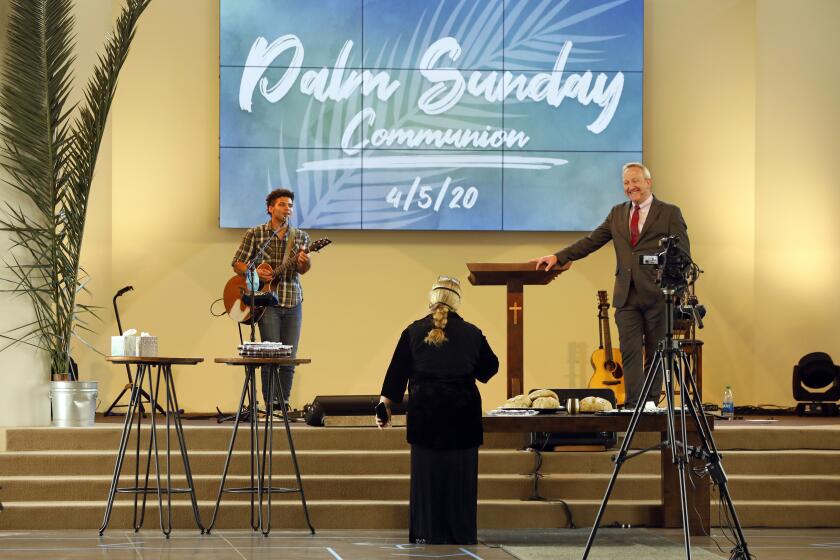Brown must use a stick on allies and a carrot on Republicans
From Sacramento — You’d think the Democratic governor and some Republican legislators could cut a deal to permit a statewide tax election. But maybe not. And that would leave the gov with three backup options:
Ignore labor. Ignore environmentalists. Ignore himself.
The Legislature — primarily Democrats — passed bills last week closing about half a $26.6-billion budget deficit with spending cuts, half the whacks aimed at poor people who are disabled, are aged, lack private medical insurance or are on welfare.
To plug the entire deficit hole — without next carving deeply into K-12 schools and public safety — Gov. Jerry Brown is asking for a special election in June to extend income, sales and vehicle tax rates for five years.
June is crucial because on July 1 the tax rates revert to the lower levels they were two years ago. And then Brown would have to advocate a tax “increase” rather than a mere “extension.” An increase, polls show, would be much harder to sell.
No one seems to know for sure what the “drop dead” date is for passing legislation authorizing the election. But it must be in the next few days. And the governor needs two Republican votes in each house for the necessary two-thirds majority.
Brown’s negotiations with five GOP senators have stalled, restarted and sputtered. The five — apparently the only Republicans with enough courage to even consider voting for a tax election — have demanded pension reforms, a tight spending cap and business regulatory relief.
But the quintet complains that while Brown seems open to their ideas, he’s being blocked by unions on pensions and spending, and environmentalists on regulatory relief. That has been confirmed by Democratic insiders.
The governor has resisted bucking labor because he needs it to help pay for the election campaign. And environmentalists represent a solid core of the Democratic constituency.
So if Brown is to avoid a complete fiscal and political meltdown — the “war of all against all,” as he characterized it to me recently — it seems he is left with these options:
•Offer the GOP a better deal and try to convince unions it’s the best bargain they’re going to get. Not extending the tax rates would hit public employees especially hard. Many thousands could be laid off and wages cut even more.
Union leaders need to get real. Voters are demanding pension rollbacks, and reformers are planning an initiative for the June 2012 ballot that could be much tougher on government retirees. Also, unions should accept a tight spending cap — locked into the state Constitution — for the duration of the tax extension. Who gives a rat about a spending limit when there’s no money anyway?
•If the GOP Five still won’t budge, employ a traditional “pick off” strategy in the Legislature. Bargain with Republicans individually. If they won’t buy into the policy, dangle pork and perks.
But any deal would need to include regulatory relief. A significant business coalition has embraced Brown’s tax-and-cuts plan, partly in hopes of obtaining relief. So relief would need to be delivered, even if it angered environmentalists. For the tax election to be successful, it must be supported by business. At this point, it would come down to substantially shortening the school year or short-cutting regulatory red-tape.
•And if all else fails, Brown should break a foolish campaign promise he made in winning election last year. He vowed — in defiance of what the founders had in mind when they created the republic — that he would give voters the final say over any tax increase. This wouldn’t even be a tax “increase.” OK, that’s semantics. But our elective representatives are supposed to make these kinds of decisions. It’s their responsibility.
Brown should have campaigned honestly, admitting that a tax extension could be necessary. He’d still have won, I’m convinced. And the office would have been more worth winning. There would have been a voter mandate for him and the Legislature to extend the taxes themselves.
If the GOP continues to block the election, Brown could tell Californians: Look, I tried, but Republicans wouldn’t let you vote. Now I need to save the state.
But then he would need some Republicans to vote for the taxes. Why would they do that if they won’t even agree to put the question on the ballot? For one, they might take great joy in watching Brown renege on his promise.
Much more important, the governor could cut a better deal for Republicans if labor didn’t have veto leverage. Or environmentalists, for that matter. There’d be no election to bankroll, no campaign coalition to build.
Of course, he’d probably need to take a stick to Democratic legislators, forcefully reminding them that their heavy majorities in each house don’t guarantee everything going their way. Or labor’s. Or the environmentalists’. Not when a two-thirds vote is needed.
But maybe Brown can still pull off an agreement with the Republican five.
That would require, at the least, a constitutional amendment altering pensions both for future and current state employees. It would necessitate a cap on pensions. And it would need to hit local government pensions, where most abuses exist.
But it’s unrealistic to think this governor and Legislature, as suggested by the Little Hoover Commission, would change state retirement to a hybrid system of smaller pensions and 401(k) plans. That’s for a citizens’ initiative.
Brown could offer a tight spending cap, not allowing expenditures to grow faster than population and inflation. Keep it in force until the higher tax rates expire. Put that on the ballot with the taxes and tie them together. One wouldn’t take effect without the other.
This would be awfully simple without the convoluted politics.
More to Read
Sign up for Essential California
The most important California stories and recommendations in your inbox every morning.
You may occasionally receive promotional content from the Los Angeles Times.











